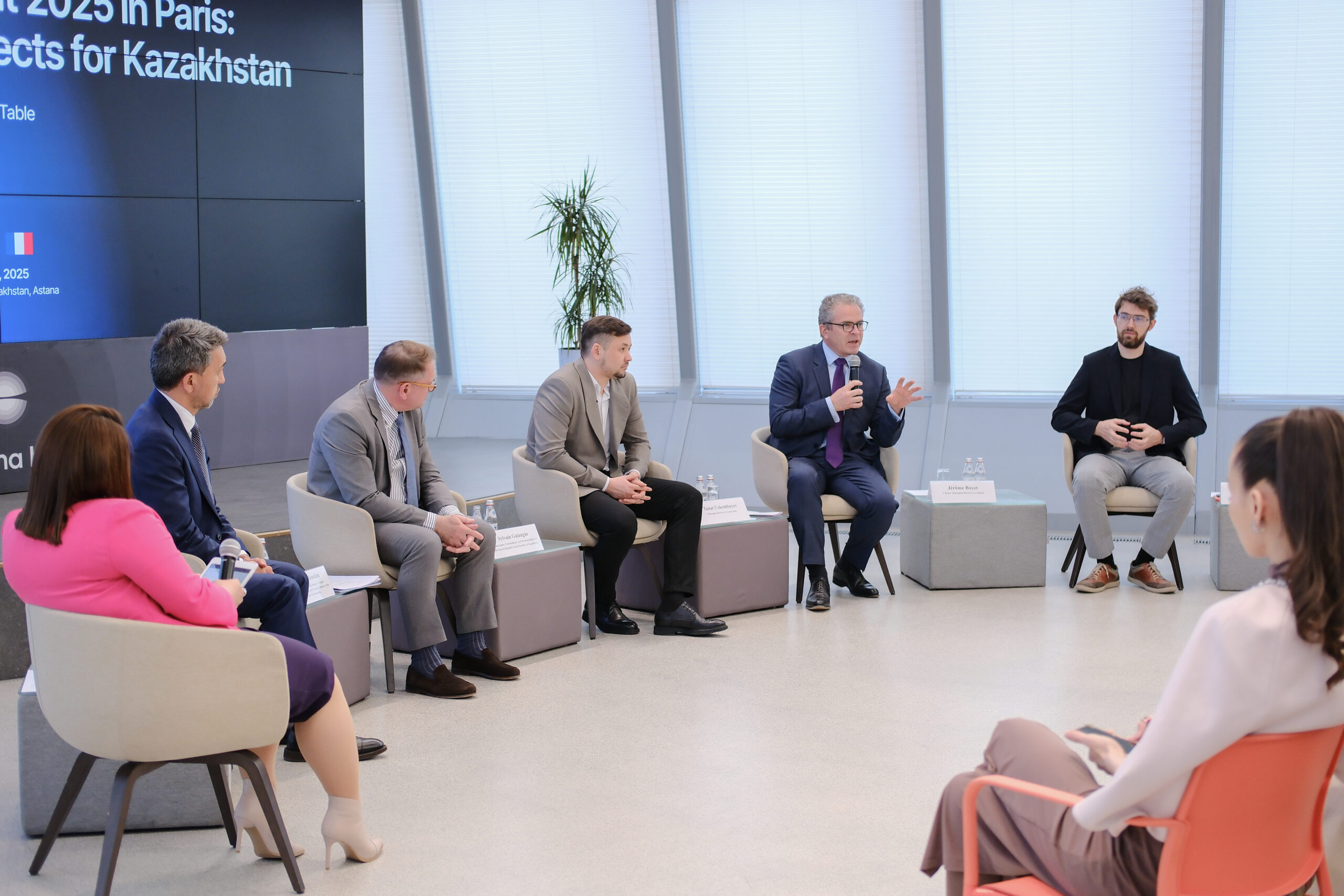ASTANA — The Embassy of France in Kazakhstan and Astana Hub, in partnership with the Kazakh Ministry of Digital Development, Innovations, and Aerospace Industry, hosted a dynamic roundtable discussion on April 2 at Astana Hub.

Boyer explained that AI is being used not only for internal purposes but also for customer-facing services, including monitoring train drivers’ fatigue levels. Photo credit: Astana Hub
Moderated by me, the session was packed with insights, particularly on AI’s real-world applications. While the first part of my coverage explored opportunities for deeper Kazakhstan-France cooperation in the AI landscape, this second part focuses on those actively deploying AI on the ground.
Jérôme Boyer, regional director of Alstom for Central Asia, shared how AI is enhancing rail transport safety and predictive maintenance, while Ivan Kononov, founder of HubLab.ai, a startup specializing in neural networks, highlighted the challenges faced by AI startups in Kazakhstan and the pressing need for stronger international collaboration. As AI continues to evolve, both speakers agreed that the technology is only at the beginning of its journey, with vast potential yet to be unlocked.
The pragmatic application of AI
One of the most eye-opening contributions came from Boyer, who detailed Alstom’s approach to AI and its growing presence in Kazakhstan. Alstom, a global rail transport and infrastructure leader, is testing AI solutions on various projects to improve the company’s internal processes and customer experience.
“We’re testing a lot of small projects, easy to scale up if successful, but also easy to fail with no real casualty products,” Boyer explained. “We are testing these projects around two types of AI: AI programming from external suppliers and our own in-house AI solutions.”
Boyer explained that AI is being used not only for internal purposes but also for customer-facing services, including monitoring train drivers’ fatigue levels. Alstom has developed a system that uses AI to monitor the facial expressions of locomotive drivers during long trips. In Kazakhstan, where the distances between stations are much greater than in France, this system will be crucial in preventing accidents caused by driver fatigue.
“When a driver in Kazakhstan travels 2000 kilometers, the challenges are different than in France, where the same journey is only 200 kilometers,” Boyer shared. “What we try to do with AI is to monitor the driver’s face and detect signs of fatigue. We can give them a warning and even stop the train if necessary.”
Boyer also discussed the AI-driven maintenance system that Alstom has implemented for its fleet of locomotives in Kazakhstan. The company uses sensors and machine learning to predict when parts of the locomotives are likely to fail, allowing for preventative maintenance. This system is already in operation, monitoring around 150-200 locomotives in Kazakhstan, and has significantly improved the accuracy of failure predictions.
Challenges facing AI startups in Kazakhstan
Next, Kononov discussed the challenges AI startups face in Kazakhstan. According to him, one of the primary obstacles for local startups is difficulty accessing international mentorship and global markets. He stressed the importance of facilitating more straightforward access to foreign investors and partners.

Kononov expressed hope for increased government support in fostering partnerships with countries like France, which has extensive experience in large language models and AI development.Photo credit: Astana Hub
“We need not only financial support but also connections, resources, and guidance from experienced mentors who can help us scale,” Kononov explained.
He also pointed out that AI startups, including his own, must focus on developing solutions that provide tangible customer benefits. At HubLab.ai, the focus is on using machine learning and neural networks to help businesses move faster and make more informed decisions.
Kononov expressed hope for increased government support for AI startups, especially in fostering partnerships with countries like France, which has extensive experience in large language models and AI development. He emphasized the potential benefits of such international collaborations for Kazakhstan’s growing AI ecosystem.
He also touched on the need for better education about artificial intelligence. He stressed that the rapid development of AI technologies has left many people struggling to understand the implications of these innovations.
“The main focus nowadays must be on education about artificial intelligence. We need to ensure that people understand what AI is, how it works, and how they can use it to their advantage,” he said.
AI’s Potential: We’re Just Getting Started
Both Boyer and Kononov agreed on one point: AI as we know it today is just the beginning. Kononov explained that current AI models, such as large language models like GPT-4, only scratch the surface of what’s possible.
“There is no single definition of intelligence,” Kononov noted. “What we are calling artificial intelligence right now is not general AI. It’s specific models, neural networks, and machine learning models. We need to understand the differences between these models, especially with the rise of generative AI.”
Kononov predicted that in the next two to three years, AI models will become much more efficient and accessible, with even everyday devices like smartphones potentially capable of running advanced AI models.
According to him, the world is only seeing the tip of the iceberg now.
“In the near future, everyone will be able to run AI models like GPT-4 on their cell phones. The next generation of AI will be more affordable and much more powerful,” he concluded.
